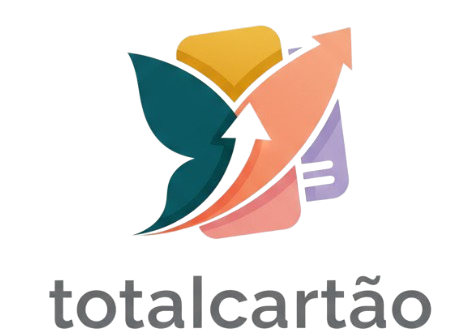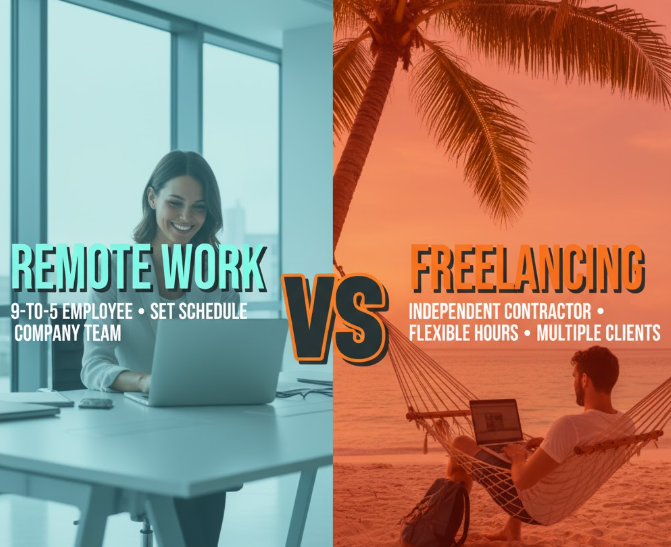How we work has changed in a big way over the past many years. With remote work, more people are refusing to slave away in office cubicles and instead work from home, coffee shops or even tropical beaches. But when it comes to terms like “remote work” and “freelancing,” you might find yourself wondering they are the same thing. Spoiler alert: they’re not!
Both telecommuting and freelancing afford you the luxury of working outside a traditional office setting, but they are actually very different in how they function. If you’ve found yourself mulling over the decision to quit your 9-5 or simply considering new opportunities, knowing the types of remote work can be super helpful! It can be the thing that enables you to determine which path will be a better fit for your lifestyle, goals and personality.
In this piece, we’ll break down all you need to know about remote work and freelancing. We’ll delve into what makes each provider stand out, compare their respective pros and cons, and hopefully assist in making the right choice about which service may work best for you.
What Exactly Is Remote Work?
Instead, you work from somewhere else. This could be in your home, at a coworking space or anywhere else with a solid internet connection.
You work from home, but you’re still an employee of a company. You receive a steady paycheck (generally every two weeks or once a month), and your employer looks after taxes, health insurance and retirement savings. You have a boss, colleagues and even traditional work hours. The main difference? You’re not working in an office building, after all.
Key Features of Remote Work
Traditional Employment: Traditional meaning that you sign a paper or digital copy to work for one single company on an indefinite basis.
Fixed schedule: Many remote jobs require you to be available and online at specific times (like 9 a.m. to 5 p.m.) even though you’re home-based.
Employee Benefits: You’ll be offered health insurance, paid vacation days (and sometimes even sick leave plans), and perhaps retirement plans.
Single Boss: You have one boss who assigns you work and reviews your work performance.
Team Collaboration: You work with the same circle of people frequently, communicating through video calls, chat apps and project management tools.
Equipment Provided: Many employers will offer a laptop, software and more to get your work done.
What Exactly Is Freelancing?
Freelancing is simply working for yourself as an independent contractor. Instead of having one boss, you have a variety of clients for various projects. You are basically running your own small business, even if you’re the only one!
Freelancers don’t receive regular paychecks from one company. Instead, they bill clients for particular projects or services. You could be designing a website for one client, writing articles for another and creating social media content for a third — all in the same week.
Key Features of Freelancing
Self-Employment: You are your own boss, you run your own business.
Multiple Clients: The average work that comes in does not come from one company but multiples.
Flexible Schedule: You control when you work, whether that be morning, afternoon, or at night. It’s totally up to you.
Project Based Work: You charge by the project, hourly or with a retainer (clients pay you for part of your time each month for ongoing work).
No Employee Perks: Clients don’t provide employee perks like health insurance, paid time off or retirement plans. These have to be put in yourself.
Own Equipment: You bring your own computer, software, phone and other tools needed.
Variable Income: How much you make can fluctuate dramatically month to month depending how many clients you have and what they are paying.
The Big Differences: Side-By-Side Comparison
Let’s compare remote work and freelancing in different areas:
| Aspect | Remote Work | Freelancing |
|---|---|---|
| Employer | You work for one company | You work with multiple clients |
| Income | Steady salary | by the hour or project – Amounts varies based on type of projects and number of clients |
| Benefits | Health, dental, retirement accounts etc | None |
| Taxes | Employers will withhold taxes | Pay your own taxes |
| Schedule | Set hours (with flexibility) | You decide when to work |
| Job Security | Stable as per contract | Unstable – Project based |
| Career Growth | Opportunities within the company | Get new casual jobs |
| Equipment | Tools are provided | Buy and maintain your tools |
| Work Location | From home or designated place | Anywhere |
| Client Relations | Manager has contacts | Direct contact with customer |
Money Talk: Income And Financial Stability
One of the most significant distinctions between remote work and freelancing is how you make money, and how stable that flow of cash is.
Remote Work Income
Remote work has the benefit of setting a solid income goal you can reach each month. At $50,000 a year, you will earn about $4,167 monthly before taxes. That predictability makes it easier to budget, plan for the future and get approved for things like apartment rentals or car loans.
Your employer withholds taxes from your paycheck, so you don’t need to worry about putting money away for tax season. And, bonuses or raises and annual salary boosts for performance.
Freelancing Income
Freelance income is also less reliable. You could earn $8,000 one month and $2,000 the next. That all depends on how many clients you will have, what they are willing to pay and how much work can you do.
The upside? Your earning potential is unlimited. If you’re good at it and can build up a strong reputation, you may be able to charge a higher rate and earn more money than at your average 9-5 job. High-paying clients can also get you there. If you’re good at what you do and choose your clients well, it’s entirely possible to become a six-figure freelancer.
But you’re in charge of setting money aside for taxes (25-30%, typically), and you’ll want to create an emergency fund in case months come around where work is slim.

Work Schedule And Flexibility
How much flexibility do you have over your schedule and work environment? This is another major difference.
Remote Work Schedule
Most remote jobs want you to work specific hours. Your business could require you to be available between 9 a.m. and 5 p.m. for meetings, collaboration and accessibility. Some remote employers are more relaxed and have “core hours” (say, 10 a.m. to 3 p.m.) where everyone has to be working and available but there’s flexibility the rest of the day.
You usually can’t just take a few hours off to run errands or have a long lunch without telling anyone. You’re still sort of subject to your employer’s schedule, even though you are working from home.
Freelancing Schedule
Freelancers experience a lot more time control. Prefer to work out at the gym in the afternoon and work from 6 AM to noon? Go for it! Like working in the still of night at home? That works too!
With few exceptions, if you hit your deadlines and clients get quality work from you, they don’t care when the work gets done. This flexibility is great for night owls, those with young kids or anyone who prefers to craft their own daily schedule.
The downside is the hard self-discipline required. Without a boss looking over your shoulder, it can be tempting to slack off or allow work to encroach on personal lives.
-
Learn for free — see this guide: How To Learn Freelancing Skills For Free Online
Benefits And Perks: What You Get
Remote Work Benefits
Remote workers usually have the same benefits as office employees:
- Health insurance: Medical, dental and vision for you and your family (most companies)
- Paid Time Off: vacation, sick, and holiday time
- Retirement savings: 401(k) match or pension contribution
- Professional Growth: Courses, Conferences and Skills development
- Stable Employment: You have a job contract and are subject to labour laws
- Equipment Stipends: Money for home office set up, company provided laptops
Freelancing Benefits
Freelancers don’t receive traditional employee benefits. You’re responsible for:
- How to get and pay for your own health insurance
- Unpaid time off (no work, no $$)
- Monitoring your retirement accounts
- Training yourself
- Generating your own job security with client relationships
Freelancers, on the other hand, receive various sorts of benefits:
- Tax Deductions: You can claim deductions related to your business such as home office, computer, software and Internet (or part of the rent).
- Uncapped Earning Potential: Never earn below a salary cap
- Location Independence: real freedom to work as you travel
- Qualify Your Clients: Only work with people and companies you like
Career Growth And Advancement
What will you do for a career? The trajectories look very different for remote workers and freelancers.
Remote Work Career Path
In a telecommuting job, you grow through promotions and raises and increased responsibility within the organization. You could begin as a junior developer and move through the ranks to be a senior developer, team lead or more broadly engineering manager.
Your development is structured by your employer, performance reviews, and vacancies. That may feel handcuffing, but it’s also a jumping-off point with guidance from seasoned colleagues.
Freelancing Career Path
Freelancers grow their careers by:
- Creating an impressive portfolio of beautiful work
- Increasing prices along with their experience
- Landing bigger, higher-paying clients
- Specializing in a profitable niche
- Making passive income on products or courses
- Eventually hiring other freelancers and turning it into an agency
Your growth is all up to your marketing and reputation, if you can do awesome work. There’s no obvious roadmap, which can be both thrilling and terrifying.
Job Security And Stability
Remote Work Security
Remote jobs offer more stability. You have a job contract that will shield you from abrupt income loss. (Most companies must give notice before firing you, and if you’re laid off, you would probably be eligible for unemployment benefits.)
Certainly no job is 100% safe anymore. Companies lay people off, become acquired or go under. But this is generally less volatile than freelancing.
Freelancing Security
Freelancing is less stable. Clients can terminate contracts on a dime, projects can dry up and economic downturns can put the kibosh to chances. You are always having to market yourself and look for new gigs.
But freelancers generate security by spreading their income. If I lose one client, I still have five others. The same is true for workers who are currently employed, but strikes or gets sick.
Intelligent freelancers create financial cushions, keep great relationships with clients and consistently market their services to craft their own form of job security.
Work-Life Balance: Can You Really Have it All?
Remote Work Balance
By erasing the commute and keeping you at home, remote work can improve work-life balance. But that can also make the line between work and personal life fuzzy.
Where it becomes difficult for a lot of remote workers is turning off work mode when one’s office minutes away. Rather than a physical separation by leaving an office, work can start spilling out during evenings, weekends and precious family time.
Establishing boundaries is critical, such as designating a workspace and work hours and “logging off” mentally at the end of the day.
Freelancing Balance
Freelancers can have stunning work-life balance: they’re in the driver’s seat in terms of managing one’s schedule. Need to be home by 5 and work no more than 4 hours a day to have three-day weekends? If you can afford it, get on with it!
But many freelancers work more hours compared with traditional employees, especially early on. The constant pressure to accept work (you never know when the good times will stop) can drive you to a burnout.
The trick is just setting boundaries with clients, charging enough so you can manage not to work 60-hour weeks and actually taking some time off even if it’s unpaid.
Which One Is Right For You?
Whether you should opt for remote work or freelancing boils down to your personality, financial position, and long-term aspirations.
Choose Remote Work If You:
- Want predictable, steady income
- Place a value on employee benefits such as health insurance
- Like to work with the same team longer period
- Such as structure and clear expectations
- Desire promotion within IT company
- Seek stability while paying down debt or saving for big goals
- Thrive on working with others and being a part of something larger
- Would rather have someone else do the business things, such as invoicing and taxes
Choose Freelancing If You:
- Looking for the most freedom and independence with your time
- Are comfortable with income fluctuations
- Be organized and well-disciplined with time
- Like to have the choice and be able to work with various clients
- Want unlimited income potential
- Are an entrepreneur and enjoy the freedom of running your own business
- Tolerate Uncertainty and You Make Your Own Security
- Want complete location independence
Can You Do Both?
Actually, yes! Most people start freelancing as a side hustle while hanging on to their salaried remote job. It provides the stability of a full paycheck while you build your freelance business.
And once your freelance income becomes consistent and at or more than the amount you earn while working in an office, it’s up to you if you want to keep juggling both or go full-time with your freelancing efforts.
Common Myths Debunked
Myth 1: “Telecommuting is the same as freelancing.”
Not at all! Remote work: you are employed by a company and do your job from somewhere outside of their office. When you freelance, your clients are essentially your employers.
Myth 2: “Freelancers earn more money than people who work remotely.”
Sometimes, but not always. A small number of successful freelancers can get paid well over six figures, but far more have difficulty finding ongoing work. Remote workers receive regular salaries but may be subject to earning caps.
Myth 3: “Remote workers have less freedom than freelancers.”
Remote workers may be less free in their schedules, but they enjoy job security, benefits and less anxiety about where the next paycheck is coming from. It’s not just about schedule, but financial peace of mind.
Myth 4: “Freelancing is easy — you just work whenever you want.”
Freelancing skills are not only an art, but also a discipline, acumen on business-ish, effective client management and immutable marketing. The flexibility is genuine, but so is the responsibility and pressure.
Myth 5: “You have to pick one forever.”
Your career isn’t about doing one thing forever. There are a lot of who do both throughout their career as they’ve done so depending on their location and the projects.
Making The Transition
From In Office To Work From Home
If you work in a traditional office setting, it is possible to ask your current employer if you can negotiate remote work. Draw up a proposal that demonstrates how you’ll maintain or boost productivity, communicate effectively and deliver results from home.
Or, look for jobs that allow you to work remotely. Now many tech companies, startups and even old-line enterprises have fully remote positions. For more tips on transitioning to remote work, check out this comprehensive guide on remote work best practices.
From Employment To Freelancing
Transitioning to freelancing takes planning:
- Develop a high value skill (writing, graphic design, programming, consultative selling etc….)
- Develop a portfolio which features your best work
- Begin with side hustling as long as you still have your job for security
- Keep 6 to 12 months of expenses in an emergency fund
- Source your first customers from your personal network, online work platforms or cold pitching
- Go for it as soon as your freelance income can sustain you month-to-month
From Freelancing To Remote Work
There’s a transition from working freelance to becoming an employee remotely as well. Your freelancing proves motivated self-starter, time management and that you’ve learnt a skill — all of which can be applied to any employer.
Show the diversity of projects you’ve done, focus on specific results and be upfront about your reliability.

Frequently Asked Questions
Q: Can remote workers work from anywhere, the way many freelancers can?
It depends on the company. Some remote jobs can be done from anywhere in the world, while others require that you reside in a specific country, state or time zone for legal and scheduling reasons.
Q: Is it true that freelancers pay more taxes than remote workers?
Freelancers pay a self-employment tax (of 15.3%, roughly) in addition to regular income tax, so that might feel even greater. But they can also deduct many business expenses, which lowers their taxable income. Remote workers typically have less money taken out, but they’re also subject to automatic withholding of taxes.
Q: Is it more difficult to find a remote job or become a freelancer?
Both have challenges. They’re competitive because many people want them — so you need to set yourself apart. Freelancing means looking for clients, a process that requires time and marketing acumen. Neither is inherently “more difficult” — they’re simply different.
Q: Can you achieve work-life balance with either route?
Yes, but there is something to be said for setting boundaries. Both remote work and freelancing can somewhat blur the lines between work and personal life — you are, after all, working from home. It is dependent on creating clear schedules and separate spaces for work.
Q: What’s better for a parent (or caregiver)?
Both can work well. Freelancing provides more flexibility in scheduling school pickups and appointments. More income stability and benefits via remote work. The right one for you depends on your personal circumstances and your investment needs.
Q: Are there specific degree or certification requirements?
Not necessarily for either. A number of remote jobs and freelance professions prioritize skills and experience over formal education. But some fields (such as health care or accountancy) will not let you sidestep the credential issue, whether you work remotely or on a freelance basis.
The Bottom Line
With remote work and freelancing, both of which liberate you from the confines of an office to some extent, there’s a world of difference in how each operates.
You get a stable paycheck and benefits, job security but the flexibility to work from home. You’re still an employee with a boss, colleagues and fixed hours — just minus the commute.
Freelancing puts you in control of your business, for total schedule flexibility and unlimited earning potential. But you do everything yourself: get clients, budget finances, pay taxes and contend with financial uncertainty.
And it’s not that one is better than the other — they’re just different. The answer is what has always been the case: stability vs. flexibility, structure vs. freedom, benefits or the limitless nature of meandering through your youth and 20s while working towards your future retirement.
Lots of people do great in remote work, and love the safety and camaraderie without office politics. Still others work as freelancers, become successful business owners and achieve the ultimate in independence.
The good news? You don’t need to make one choice and then live by it for the rest of your life. Your career can take different turns, and as your life situation changes or as you have different goals, these working styles are definitely malleable.
What sort of person are you, what are your financial requires and what longterm aims do you have? Do you have enough of a structure monster in you that that’s always going to be an urge, or do you feel like now will things continue to evolve? Do you desire the security of employee benefits, or are you prepared to sacrifice that for freedom and flexibility?
Whatever you decide, the world of work has permanently changed. Both remote work and freelancing are here to stay, meaning more people than ever will have the opportunity to design careers around their lives — rather than lives around their careers.




